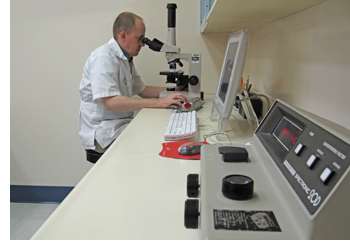
Proper examination of blood, urine, cerebrospinal fluid (CSF) and nervous system tissues is important in evaluating the overall health of a patient as well as providing signs to the cause of certain neurological disorders. For immediate results, several lab tests are performed on-site at the Veterinary Neurological Center. Many off-site laboratories are utilized for less time sensitive results or for tests which may require special equipment.
On-Site Laboratory Testing
Preanesthetic Blood Tests
The Veterinary Neurological Center requests that each patient have a chemistry panel and complete blood count (CBC) performed prior to undergoing any anesthetic procedure. Often this has recently been performed by the referring veterinarian but if it has not or if there is reason for concern, the neurologist at the VNC will run an in-house chemistry and complete blood count (CBC) or, if necessary, send a blood sample to an off-site laboratory for testing. In all cases, however, an in-house preanesthetic panel is always performed prior to anesthesia.
The VNC’s Preanesthetic Panel:
The VNC’s Preanesthetic Panel:
- packed cell volume (PCV)
- total protein (TP)
- blood urea nitrogen (BUN or AZO)
Depending on these results and other factors, the following tests may also be run on-site:
- blood glucose
- urine specific gravity (USG)
The results of these tests provide important information about the overall health of the patient. When the test results are examined collectively, the neurologist can determine if it is safe for the patient to undergo anesthesia. If results are found in any of these tests that gives reason for concern of a systemic problem, then more comprehensive tests will be requested at an off-site laboratory, possibly postponing the anesthetic procedure until the patient’s current problem is resolved.
Cerebrospinal Fluid Analysis
The analysis of cerebrospinal fluid (CSF) may aid in determining the mechanism of a CNS disorder, especially inflammation. In a procedure called a spinal tap, a needle is inserted into the subarachnoid space and CSF is withdrawn. General anesthesia is administered in order to keep patients still during the procedure and skilled technicians monitor the patient closely. The CSF is analyzed by determining the morphology (type & appearance) of cells, protein level and overall white (and red) cell count. Abnormal findings may provide clues to the cause of a neurological problem. Further testing of the blood serum and/or CSF by an off-site laboratory may offer additional information to help diagnose the problem.
Bromide Testing
Potassium bromide and sodium bromide are compounds that patients with epilepsy are given orally to control seizures. The proper balance of bromide level in the blood stream is important. As a service to clients and referring veterinarians, the Veterinary Neurological Center provides in-house laboratory testing to measure patient bromide levels. The methodology was developed at the VNC in 1996 and strict quality control is implemented to provide accurate results. Veterinarians interested in sending samples for testing may fill out the Bromide Submission Form and have it delivered along with at least 1 ml of serum on ice to the VNC. Results will be faxed or emailed to the veterinarian, usually, within 48 hours of receipt of the sample.
►Click here to learn more about anticonvulsant
Off-Site Laboratory Testing
The Veterinary Neurological Center utilizes the services of both private and university veterinary laboratories for the analysis of samples such as blood, serum, urine, feces and CSF, as well as biopsy tissues including nerve, muscle and tumor.
This information is meant to be a guide and not a substitute for veterinary care.
Always follow the instructions provided by your veterinarian.
